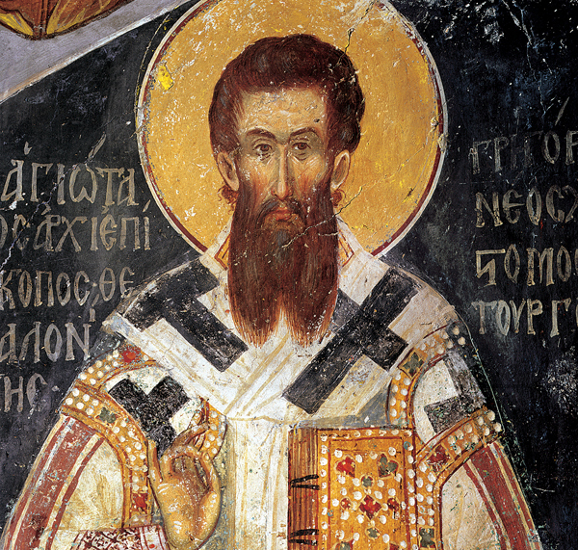“Son, your sins are forgiven”
Some Jews brought a paralytic to Jesus asking, of course, to heal him and deliver him from his sickness. Jesus, however, turned to this paralytic as if he did not see his sickness -and this sickness is easily noticed in man.- He saw some other sickness that He only can heal, saying to him, “Your sins are forgiven.” The Jews were surprised! First, we do not know how much they weigh the responsibility and importance of sin. Second, we ignore their understanding of sin. These two things made them surprised. The emphasis of Jesus on the issue of sin leads us to ask ourselves about our notion of sin.
Today, the second Sunday of Lent, the Church remembers also Saint Gregory Palamas. This Saint waged a fierce opposition against a threat to the Christian life in the Fourteen-century. This threat was called Rationalism and its initiator was Barlaam. What really threatens our life and faith is not unbelief in the existence of God. This was the shape of the late atheism. The contemporary atheism, however, lies in changing, falsifying, and corrupting the nature of faith. Therefore, the danger on the faith is not anymore the ideologies and outside pressures, but rather the degree of the purity of faith and living truly (from our inner being) the Christian ideology. If we look at our understanding of sin, and this is an important matter for our relationship with God and our salvation, we will find out that this understanding (which is very sensitive) is really threatened, and perhaps corrupted, because of the influence of the restricted Barlaamite Western Rationalism. Let’s than discover what sin is!
Rationally, man wonders today why in the language of religion, we call some actions “sin!” These actions may be very suitable for me, personally, satisfying some of my personal pleasures, without affecting or disturbing others. Sometimes they may even be beneficial for others! Why, then, is there such an “old” and “complicated” view of sin?!
Using this Rational Way, most people analyze and form their understanding of sin, leading themselves to a confrontation against the “old” religious understanding of it. Afterwards, people would desire to overstep all bounds and barriers, or any moral restraint. They do this even if the cost was silencing the inner voice of their conscience, leaving behind all the inner confusion that this analytical approach leaves in man. Later on, they resort to giving different names to their actions, in order to justify themselves. Let’s take the most important and most sensitive human behavior and actions, and ask ourselves about the understanding of the contemporary man to sin in these actions. We would discover that often we corrupt this understanding by exchanging cheating with cleverness, adultery with love, exploitation with service, personal interest with charity, entertainment and relaxation with happiness, etc. Because we rationally analyze all these conceptions, we see that everything is right.
Let’s think rationally, as man would do today, using “modern notions or conceptions.” Does bribing hurt anyone, when it facilitates the work of all parties? What’s wrong in fornication, for example, if it satisfies the passions of both parties? What is wrong in slavery and bondage, if everyone is contempt? Is it shameful for us to ask for our own interest? Why do we have to bear sacrifices and love and all these heavy evangelical and angelic burdens, and we are just men?! Does a little repose in a recess hurt humans?!… and many other questions. Where is sin in all these subjects?
Rationally, even when we are religious – and how much this state carries bad connotations and dangers – we are mistaken in explaining sin, defining it as a violation of the divine commandment! As if the one hurt from this subject is God, who in His justice, probably in His “selfishness” and honor, wants to recover all the rights due to Him by imposing sanctions in this life before the Hell of the life to come. Even though if we think in a deeper way, we would have realized that sin cannot touch God or affect Himself. If God prepared for us laws and regulations forbidding us from sin, He has done so not for His own sake, but for us “for our good always, that He might preserve us alive” (Deut. 6:24). He is the God of the Holy Bible, our God. He is not the God of the Epicurean or Aristotle who does not care about the fate of man and the world.
Sin, from a Christian and practical point of view, as defined by Saint Gregory Palamas, is the refusal of God as a Father, refusal of His paternal love, refusal of the divine Grace, and living in rational solitude. What saddened the Father in the parable of the Prodigal Son is the going away of his son. The latter insulted his father by depriving him from his presence as a son; therefore, his sin cannot be forgiven unless he returns back. The abounding love of God has made God, if we may say, “susceptible to being hurt.” It is sin to refuse the light and accept the darkness, when the light was revealed to us. The sin of the son consists in that he just rationalizes things. The biggest insult to the Father is ignoring His love. The child has the right to think, but when his parents and caregivers are next to him, he is remiss (if he rationalize too much). We can live rationally and define our destiny by analyzing, but we can also live with God in His rationalism, that is by faith. Only then we give the Father what is due to Him. Adam did not miss anything in essence, except that he wanted to live, think, and plan for himself without God. To separate ourselves from God means to leave God alone. Isn’t this true atheism? This is then the sin between the father and his son, between God and us. It is a sin to live claiming that we are sons, but at the same time behaving as if the love of God is nonexistent. To live with God does not mean at all that we know everything about God. To live with Him is to be joyful about our life with Him, that He may become our joy. For example, reading about theology just to know about it is a sin. If we read theology and we do not be joyful, pious, and full of life, than we are insulting God who came to us as life. God did not come to make our mind busy, but rather to warm up our heart. Life with God is not just information, but experience. God cannot be conceived and described by studies, but spoken about from experience. Studies are positive when they add on to our experience. Barlaam represents the deceof religion as knowledge, and Saint Gregory Palamas reminds us of the experienceof religion as life.
God entrusts us with His love, for He knows that we live only by His love. From the Orthodox view, man does not live except on the heavenly manna, that is the divine grace. He does not live by bread, but by grace and by every divine word coming from the mouth of God. Every serum, different than the divine grace, we give to today’s paralytic man is a corrupt and deadly serum, because it does not bring life. On this basis, we define sin as a “loss,” because we refuse the grace given to us and live in the limiting boundaries of the mind. It is sin to say No to the divine love abounding on us, and remain in the limits of the body, and live as “humans,” while the divine grace abounds in us, calling us to live as gods. From this view to sin, we can understand why Jesus wanted first to forgive the paralytic before healing him. From just a rationalistic view, we can ask ourselves what is the purpose of Lent, except torturing the body, what is the use of prayer, for it seems stupid to pray… If we seek the divine grace, the questions are reversed, and we ask, why don’t we fast, pray, and keep vigil…
Do you believe? This is the risk of believing, and this is its proper place, that we sail relying on the winds of grace, not on our own rowing. For every belief, there are dimensions. Rationalism has its boundaries that do not exceed the limits of the body, humanity and atheism. The dimensions of the faith are different, because it opens up to the divine and deifying grace and takes us in spirit to the paradise of saints. The life with God is not defined by the theoretical knowledge. God is not the subject of research, but is known by personal experience. So how do we get to the fellowship between God and us? How do we finally define sin?
Every faith, and every walk and purpose, has its own definition of sin. Saint Seraphim of Sarov defines the purpose of the Christian as “Acquiring the Holy Spirit.” Therefore everything that hinders us from this purpose is sin. On the scale of this balance we ought to weight bribing, self-interest, and all other desires, not on the scales of the rational mind of today’s man. This is our greatest sin, as the epistle of today says, that all who neglected the message that came through the angels were condemned, so “How shall we escape, if we neglect so great salvation” (Heb. 2:3), refusing the grace?
Today, this is the cry of Saint Palamas that we challenge the rational mind, seeking grace, by vigils, prayers, and fasting, going beyond the limited earthly world of rationalism. The righteous shall live by faith, so that if we accept in purity the divine grace, we reach and become worthy of Christ’s words:
“Son, thy sins be forgiven thee.” Now that you are well, do not return to sin. Amen.
https://paulyazigienglish.wordpress.com


